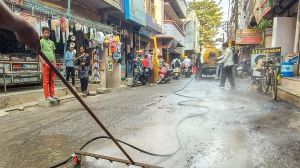Bhutto146;s protest call sets up confrontation
Escalating political tensions in Pakistan, the opposition leader, Benazir Bhutto announced on Wednesday that her party...

Escalating political tensions in Pakistan, the opposition leader, Benazir Bhutto announced on Wednesday that her party would carry out a mass demonstration on Friday and a protest march next week if the President, General Pervez Musharraf, refuses to end a state of Emergency and hold elections in January.
Bhutto8217;s statements 8212; which were followed by violent clashes between her supporters and police 8212; set up an immediate confrontation with General Musharraf. Under General Musharraf8217;s Emergency decree, all public protests are banned.
8220;We are going ahead with the protest on the ninth,8221; Bhutto announced at a press conference after meeting with other opposition parties in Islamabad. 8220;I understand my liberty might be at stake.8221;
After Bhutto8217;s press conference, police fired tear gas and beat about 100 of her party workers when they tried to push through police barriers blocking public access to the country8217;s Parliament building in Islamabad.
The threat of mass protest by Bhutto represents an escalation in the opposition to General Musharraf.
Until now, Pakistani lawyers have led the challenge to Emergency rule, carrying out small protests, and many hundreds have been beaten or arrested. But Bhutto8217;s party, the biggest opposition political party, is widely seen as the only force capable of bringing large numbers of protesters onto the streets.
The authorities have said they will not allow Friday8217;s demonstration, which is scheduled to take place in the garrison town of Rawalpindi, close to Islamabad. 8220;We will ensure that they don8217;t violate the ban on rallies,8221; said Javed Akhas, the city8217;s Mayor, The Associated Press reported. 8220;And if they do it, the Government will take action according to the law.8221;
Akhas said there was a 8220;strong threat8221; of a terrorist attack against Bhutto. On October 18, she survived a suicide bombing attack in Karachi that left at least 140 people dead.
Bhutto8217;s choice for the route of next week8217;s protest march is particularly significant. Protesters will travel from the eastern city of Lahore to Islamabad, a route of 162 miles that will bring them through the heart of Punjab, the country8217;s largest and most powerful province.
The vast majority of the country8217;s army hails from Punjab and the military has hesitated in the past to fire on civilians in the province. Widespread popular unrest there could cause senior Pakistani army commanders to turn on General Musharraf and ask him to resign, some analysts say.
Bhutto8217;s strategy appears to be relying on the fact that General Musharraf will back down before protests are held, or that senior army officers will decide that the President is doing so much damage to the army as an institution that they should force him to resign.
General Musharraf, in turn, could gamble that Bhutto will not be able to draw large crowds on what she called the 8220;long march8221;. Lahore is not her home province and her time in office was marred by corruption charges.
There is also widespread speculation that Bhutto, who some have criticised for moving too slowly to launch protests against Emergency rule, will strike a deal with General Musharraf. Lawyers who have carried out protests all week have questioned her commitment to fully ending military rule.
If she does manage to rouse large numbers of protesters in the Punjab, this could demonstrate to American officials that General Musharraf has lost popular support in the country.
After arriving in Islamabad from Karachi on Tuesday night, Bhutto met with party stalwarts to organise the protest strategy. On Wednesday morning, she met with members of other opposition parties.
She was expected to meet with the American ambassador to Pakistan, Anne W Patterson, the United States embassy said.
Washington was the main broker for the deal to bring Bhutto back to Pakistan last month after eight years of self-imposed exile abroad where she went to escape prosecution on corruption charges.
The Bush administration, anxious to put a democratic face on the military Government, has been calling in the last few days for General Musharraf to end the emergency rule and call parliamentary elections.
How General Musharraf will respond to the threat of protests, and how far he will listen to the pressure from Washington is one of the key questions in the current stand-off.
In interviews before Bhutto8217;s announcement, Pakistani analysts said that holding elections would be the easiest way to avoid instability in the country, and that protests led by Bhutto represent the greatest threat to General Musharraf.
At the press conference today, Bhutto was quoted by the BBC as saying: 8220;I appeal to the people of Pakistan to come forward. We are under attack.8221;
She added that the protest rally could be held in Lahore if the authorities stopped it taking place in Rawalpindi.
- 01
- 02
- 03
- 04
- 05































